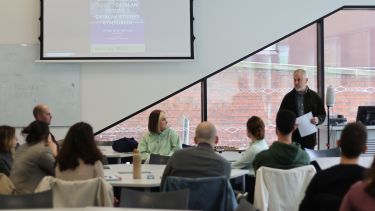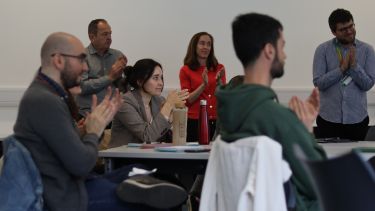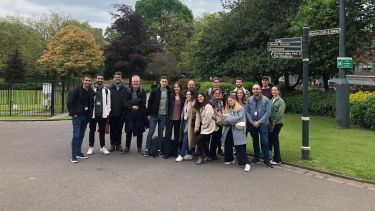On Wednesday, there was a workshop for UK and Ireland based Catalan Tutors, organised along with the Institut Ramon Llull. Catalan teachers from 12 different universities (Universities of Edinburgh, Liverpool, Glasgow, Bristol, Birmingham, Queen Mary University of London, Manchester, Sheffield Hallam, Cardiff, Cork, Leeds, Newcastle and Maynooth) attended the conference. It started with some words of welcome by Professor Susan M. Fitzmaurice, Vice President and Head of the Faculty of Arts and Humanities; Dr Louise Johnson, Director of Catalan Studies; Dr Giles Harrington, Director of Education (MLTC) and Marc Dueñas, Head of the London Office of the Institut Ramon Llull. Afterwards, Pol Masdeu Cañellas, the University of Sheffield's Catalan instructor, and Núria Massot, from SLC, explained how subtitling is a didactic resource with great potential in a foreign language class. The last talk on Wednesday was conducted by Professor Mary Vincent, Vice-President for Education for the University of Sheffield. Professor Vincent talked about the links between British Historians and Catalonia, focusing on the 1930s. To end the day, students from Catalan language modules led a campus tour to introduce our university to the guests. On Thursday, Dr Louise Johnson spoke about challenges in the translation of literature from Catalan to English. To finalize the conference, there were presentations by different Catalan teachers from other institutions.
Following this on Thursday afternoon, the first Catalan Studies Symposium took place, in which several doctoral students presented their ongoing work on different areas, such as history, urbanism, language teaching, or literature. Ten different students from the Universities of Sheffield, Leeds, University College Cork, Swansea, Warwick, St Andrews and Newcastle participated. The symposium was also organised by the university and the Institut Ramon Llull, in collaboration with the Arts and Humanities Research Council and the White Rose College of the Arts and Humanities.
Both events were a success and a great opportunity for both instructors and PhD students to find a place to meet and share their experiences and ideas. Catalan Studies has a long history in Sheffield, starting in the 1950s, when Catalan language and culture were forbidden in Spain under Franco's dictatorship. Since then, Sheffield has been recognised as an international centre of excellence for the teaching of Catalan and related research.




